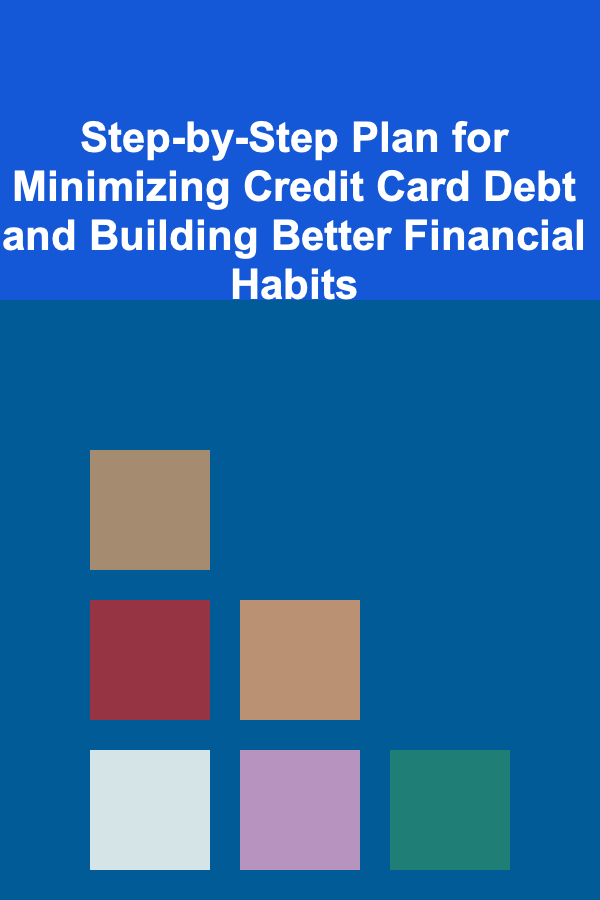
Step-by-Step Plan for Minimizing Credit Card Debt and Building Better Financial Habits
ebook include PDF & Audio bundle (Micro Guide)
$12.99$8.99
Limited Time Offer! Order within the next:

Credit card debt can feel like a heavy weight hanging over your financial life. With high interest rates, late fees, and the temptation to keep spending, it can be easy to fall into a cycle of debt that seems impossible to escape. However, the good news is that with a clear, actionable plan, you can minimize your credit card debt and build healthier financial habits moving forward. This guide will walk you through practical steps that you can take immediately to reduce your credit card debt and set yourself up for long-term financial success.
Understand Your Current Financial Situation
The first step in tackling credit card debt is understanding exactly where you stand. Without knowing the full extent of your debt, it can be challenging to come up with an effective plan. Here's how you can begin:
Actionable Steps:
- List All Your Credit Cards: Write down all your credit card balances, interest rates, and minimum monthly payments. It's crucial to understand the total amount of debt you owe.
- Review Your Credit Reports: Check your credit report to ensure there are no discrepancies or errors in your debt information. You can request a free report once a year from the three major credit bureaus (Equifax, Experian, and TransUnion).
- Track Your Expenses: Begin tracking your spending to identify areas where you can cut back. Apps like Mint or YNAB (You Need A Budget) can help you stay organized.
By understanding your current debt situation, you can make more informed decisions about how to proceed with reducing it.
Stop Accumulating More Debt
To effectively minimize your credit card debt, you must stop adding to it. While it may seem like a simple step, this can be one of the most challenging aspects, especially if you're used to using credit cards for everyday purchases.
Actionable Steps:
- Cut Out Unnecessary Expenses: Review your budget and identify non-essential purchases you can eliminate. This might include dining out less, reducing impulse buys, or canceling unused subscriptions.
- Leave Your Credit Cards at Home: Consider leaving your credit cards at home when you go out. Use cash or debit cards for purchases to avoid the temptation of charging items to your credit cards.
- Use a Debt Card for Essentials: If you absolutely need to make purchases, consider using a debit card that links directly to your checking account. This will prevent you from adding more debt to your credit cards.
- Set a Credit Card Limit: Temporarily set a low spending limit on your cards to keep yourself in check.
Stopping the accumulation of more debt is crucial for breaking free from the cycle of overspending and credit card interest. It's important to be mindful of your purchasing habits and adjust them accordingly.
Pay More Than the Minimum Payment
Paying only the minimum payment on your credit cards might seem like the easiest option, but it will actually prolong your debt repayment and cost you more in interest over time. The key to minimizing your credit card debt is paying more than the minimum amount due each month.
Actionable Steps:
- Pay More Than the Minimum: If possible, aim to pay at least double the minimum payment. This will help reduce both your principal balance and the interest you're paying.
- Target the Highest Interest Rate Card First: If you have multiple credit cards, prioritize paying off the one with the highest interest rate. This is known as the "avalanche method" and will save you the most money in interest.
- Allocate Any Extra Funds Toward Debt: Whenever you receive extra money, such as a tax refund, bonus, or side income, put that toward your credit card debt to accelerate your progress.
The more you pay above the minimum payment, the quicker you'll pay down your debt. This approach is essential for reducing the total interest you'll end up paying over time.
Consider Debt Consolidation or Refinancing
If you have significant credit card debt spread across multiple cards, you may want to consider consolidating your debt into one payment. Debt consolidation can simplify your finances and possibly lower your interest rates, making it easier to pay off your balance.
Actionable Steps:
- Look Into Balance Transfer Cards: Some credit card companies offer introductory 0% APR balance transfer promotions. If you qualify, transferring your existing debt to one of these cards could save you money in interest over a set period (typically 12 to 18 months). Just be mindful of any balance transfer fees and the interest rate that will kick in once the promotion ends.
- Personal Loans for Debt Consolidation: If balance transfer cards aren't an option, you may qualify for a personal loan with a lower interest rate than your credit cards. A personal loan allows you to consolidate multiple credit card debts into one monthly payment.
- Consider a Debt Management Plan (DMP): Some non-profit credit counseling agencies offer Debt Management Plans, which can help negotiate lower interest rates with your creditors and create a structured payment plan.
Consolidating your debt can give you a clearer path to becoming debt-free and can often result in paying less interest over time.
Build an Emergency Fund
One of the key contributors to credit card debt is the lack of an emergency fund. Without savings, you may be forced to use credit cards to cover unexpected expenses, such as medical bills, car repairs, or home maintenance.
Actionable Steps:
- Start Small: Aim to save at least $500 to $1,000 for an emergency fund. This can cover smaller unexpected costs without having to rely on credit cards.
- Set Up an Automatic Savings Plan: Set up an automatic transfer from your checking account to your savings account each month. Even $25 a month can add up over time.
- Use Windfalls for Savings: Whenever you receive unexpected money, such as a bonus or tax refund, put a portion of it directly into your emergency fund.
Having an emergency fund will reduce your reliance on credit cards in the future, helping you avoid accumulating debt for unforeseen circumstances.
Build Better Financial Habits
Building better financial habits is crucial for avoiding credit card debt in the future. While paying off debt is important, preventing more debt from accumulating is equally vital. Here are some tips for improving your overall financial habits:
Actionable Steps:
- Track Your Spending: Use budgeting apps or spreadsheets to track your expenses. This will help you identify where your money is going and where you can cut back.
- Set Financial Goals: Set both short-term and long-term financial goals. These goals could include saving for retirement, buying a home, or paying off your credit card debt in a specific timeframe. Having clear goals will give you something to work toward.
- Live Below Your Means: One of the best ways to avoid future credit card debt is to consistently live below your means. Make sure your spending doesn't exceed your income, and aim to save and invest a portion of your earnings each month.
- Educate Yourself: Read books, take courses, or listen to podcasts about personal finance. The more you know about money management, the better equipped you'll be to make sound financial decisions.
Improving your financial habits is a long-term strategy that will ensure you remain debt-free and financially stable in the future.
Seek Professional Help if Necessary
If you're feeling overwhelmed or are unsure of how to proceed, it may be time to seek professional help. Financial advisors, credit counselors, and debt management professionals can provide personalized guidance tailored to your unique financial situation.
Actionable Steps:
- Consult a Credit Counselor: Non-profit credit counseling agencies can help you negotiate with creditors, set up a debt management plan, and provide budgeting advice.
- Consider Financial Therapy: If your financial situation is causing significant emotional stress, speaking with a financial therapist may help you address underlying psychological issues related to money.
Professional help can provide much-needed support, especially if you're feeling stuck or uncertain about how to move forward.
Conclusion
Minimizing credit card debt and building better financial habits is a gradual process that requires discipline, patience, and consistency. By following this step-by-step plan---understanding your finances, stopping debt accumulation, paying more than the minimum, considering debt consolidation, building an emergency fund, and improving your financial habits---you can set yourself on a path to financial freedom.
Remember that getting out of debt isn't an overnight accomplishment. However, by taking small, deliberate steps every month, you'll gradually build momentum and gain control of your financial future.
Reading More From Our Other Websites
- [Home Family Activity 101] How to Create a DIY Family Obstacle Course in Your Backyard
- [Gardening 101] Illuminating Your Oasis: 7 Essential Principles of Garden Lighting Design
- [Home Soundproofing 101] How to Soundproof Your Home Theater Room
- [Home Renovating 101] How to Update Your Home's Lighting Fixtures for a Fresh Look
- [Organization Tip 101] How to Foster Team Bonding in a Remote Environment
- [Organization Tip 101] How to Use Drawer Dividers for Organized Bathroom Cabinets
- [Tiny Home Living Tip 101] Best Budget‑Friendly Interior Design Themes for Tiny Home Living That Feel Luxe
- [Home Renovating 101] How to Choose the Best Tools for Your Home Renovation Projects
- [Home Family Activity 101] How to Make Educational Fun: Creative Art Projects for Families Using Recycled Materials from Your DIY Bird Feeder Project
- [Sewing Tip 101] Creative Button Techniques: Embellish Clothing and Accessories with Unique Stitches

How to Maintain Your Home's Water Filtration System for Clean Water
Read More
How to Organize Party Games and Activities for All Ages
Read More
How to Use Testimonials and Case Studies Effectively on a One-Page Website
Read More
Simple and Stylish Frugal Gift-Wrapping Ideas for Every Occasion
Read More
10 Tips for Filing Form 4506-T: Transcript Requests
Read More10 Tips for Automating Your Utility Expense Tracking
Read MoreOther Products

How to Maintain Your Home's Water Filtration System for Clean Water
Read More
How to Organize Party Games and Activities for All Ages
Read More
How to Use Testimonials and Case Studies Effectively on a One-Page Website
Read More
Simple and Stylish Frugal Gift-Wrapping Ideas for Every Occasion
Read More